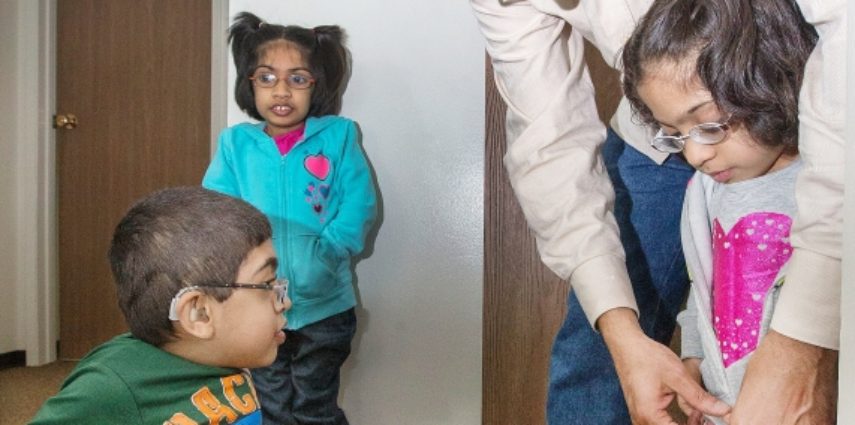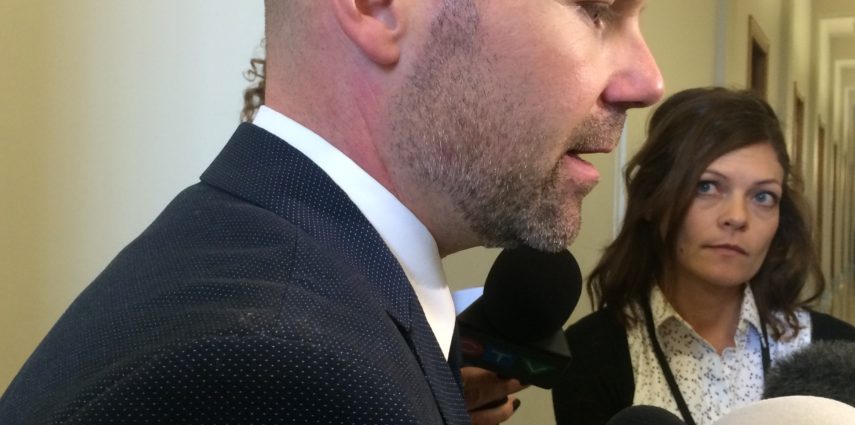TREATMENT REQUIRED IMMEDIATELY BY 3 SASKATOON SIBLINGS; ADVOCATES CALL ON PROVINCE TO ALLOW IMMEDIATE ACCESS WHILE REVIEW TAKES PLACE
“We’re calling on Minister Duncan to tell the public the truth about this drug. His statements so far have been misleading and, frankly, categorically untrue.”– Andrew McFadyen, The Isaac Foundation
The Saskatchewan Minister of Health has ordered a full review of his recent decision to deny access to a life-saving medication for 3 siblings from Saskatoon. 8 year-old Sara Amir, along with her siblings Khadija, 10, and Muhammad, 12, suffer from MPS IVA (Morquio Syndrome) and require the life-saving treatment immediately in order to halt further progression of their devastating disease. On Friday, October 2nd, the Minister denied funding for the treatment. After meeting with the children’s father, Amir Akhter, and members of The Isaac Foundation and the Canadian MPS Society, he agreed to revisit the decision and consult International experts that deal first-hand with the disease and the drug treatment.
Andrew McFadyen, Executive Director of The Isaac Foundation, an advocacy, research, and family support organization that specializes in MPS related diseases, was happy with the news. “We are very pleased with this development and hope that this review takes a serious look at the vast amount of available evidence that exists both in this country and Internationally. The reality here is that Saskatchewan is denying access for these kids at a time when almost every other developed nation in the world are approving access for their kids. There is an incredible disconnect that exists between the initial decision from the Minister and what is happening in other jurisdictions and throughout the rest of the world.”
While pleased with the developments, McFadyen is frustrated with the misinformation being provided by the Minster of Health regarding the impact this treatment has on patients. “The Minister continues to say that there isn’t evidence to show this treatment works in patients over the age of 5. The real truth is that there are 29 patients receiving this drug in Canada. 27 of those patients are over the age of 5 and the vast majority of those patients are over the age of 13. Every one of these patients is seeing improvements. All of them. I’ve told Minister Duncan this on numerous occasions so either the Minster is being fed misinformation from the bureaucrats in his ministry or he is deliberately misleading the public to help justify his cruel decision to deny these kids the help they need. Either way, the evidence just doesn’t support the statements he is making and I think the public and this family deserve to know the truth.”
Jamie Myrah, Executive Director of the Canadian MPS Society, is calling on Health Minister Dustin Duncan and Premier Brad Wall to allow the siblings to begin treatment immediately while the review of their applications takes place. “These kids have waited long enough and they need to begin therapy now. We can’t afford to wait any longer.”
With respect to the review, McFadyen hopes it will be thorough and transparent, and free from Ministry bias and interference. “I’ve sent a message to the Minister asking for a fair, objective, and transparent review of these applications. It is our hope that the true experts –experts from around the world that deal with this disease, experts that treat this disease on a daily basis – have an opportunity to see the baseline data and weigh in on the merits of providing therapy for these children. We also feel like it’s imperative that the reviewers are identified to the public, again so we can be sure the process is as transparent as possible. We want to make certain they are using the true experts to look at this, unlike the initial review that took place.” Thus far, McFadyen hasn’t received a response from the Ministry but adds, “I’m hopeful to hear something today.”
In the meantime, he says he will be in attendance during Question Period when the Legislature resumes sitting next week. “The lives of these kids depend on this drug, and I won’t sit idly by and watch them to die. I’ll be in there every day until a decision is rendered, and I’ll be readily available to the Minister and his office if they need more help and information along the way.”
# # #
For more information about this topic, or to schedule an interview with Andrew McFadyen, please call Andrew at 613-328-9136 or email Andrew at mcfadyena@me.com. The Isaac Foundation can also arrange interviews with parents of patients currently receiving this treatment in Canada.
Backgrounder
Sufferers of Morquio Syndrome lack an enzyme in their blood that breaks down cellular waste in the body. This waste builds up in the bones, tissues, organs, and muscles of affected individuals and leads to many devastating symptoms including heart and airway disease, corneal clouding, stiffening of the joints, shortened stature, and premature death.
There are 29 patients receiving therapy in Canada. 2 patients are under the age of 5 while 27 are older. The vast majority of patients are over the age of 13 and the oldest patient receiving therapy is 39.
While not a cure for Morquio Syndrome, the necessary Enzyme-Replacement Therapy (ERT) is designed to provide patients with a synthetic version of the enzyme they are lacking by infusing small doses into the patient’s bloodstream on a weekly basis. The treatment slows down or halts progression of the disease in patients, improves endurance, walking distance, breathing problems, and provides other benefits to sufferers that dramatically improve their quality and length of life. International experts and a Canadian Panel of Genetics Specialists have all recommended Vimizim as the front-line treatment for Morquio Syndrome. Vimizim was approved by Health Canada in July 2014, and is currently being reimbursed for use by patients in Saskatchewan, Ontario, and Quebec. Recently, the National Institute for Health and Care Excellence (NICE) recommended reimbursement for all 88 patients suffering from Morquio Syndrome throughout the UK.
The therapy has been recommended by a Canadian Expert Panel comprising of MPS experts from BC, Alberta, Saskatchewan, Ontario, and Quebec, and International Treatment Guidelines for Morquio Syndrome highlight this treatment as the gold standard of care for affected patients.
FOR IMMEDIATE RELEASE: MINISTER ORDERS REVIEW OF DECISION TO DENY LIFE-SAVING DRUG. October 8th, 2015mcfadyena












